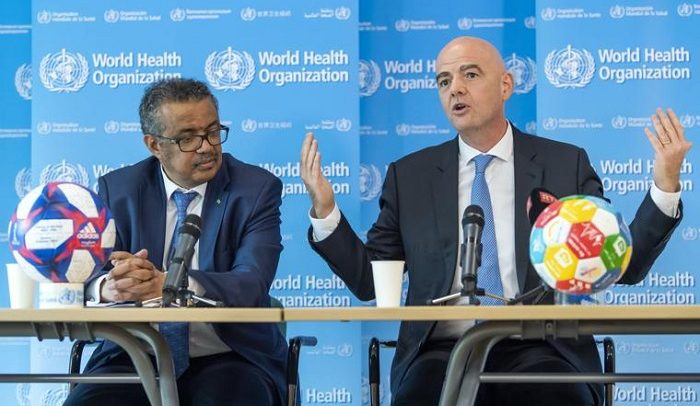WHO Director-General Dr Tedros Adhanom Ghebreyesus (left) and FIFA President, Gianni Infantino.
The World Health Organization (WHO) and football’s world governing body, FIFA, have entered into a four-year collaboration to promote healthy lifestyles through football globally.
The collaboration will leverage the two organizations’ respective strengths to ensure health messages and activity-related programmes can have a major positive impact on the lives of people all around the world.
WHO Director-General, Dr Tedros Adhanom Ghebreyesus, and FIFA President, Gianni Infantino, signed the memorandum of understanding at WHO’s Geneva-based headquarters.
“WHO is excited to be working with FIFA. Half the world watched the 2018 World Cup. This means there’s huge potential for us to team up to reach billions of people with information to help them live longer healthier lives,” said Dr Tedros.
Mr Infantino also indicated “I am extremely happy to announce this collaboration with WHO. Football is a unique, universal language and we want to use our platform and network to support health initiatives and promote healthy lifestyles all around the world.”
The areas of collaboration are advocacy to promote a healthy lifestyle through football; policy alignment to ensure tobacco-free environments at FIFA events; to encourage national football federations to adopt tobacco-free policies, including at stadiums; and to enable WHO to provide technical advice to FIFA on health matters.
Other areas are building on FIFA events to institute lasting improvements in health and safety and hosting joint programmes and initiatives to increase participation in physical activity through football, in line with WHO guidance, as well as working with national associations and networks of WHO goodwill ambassadors, football players, coaches and volunteers to increase physical activity through football.
WHO will provide technical advice to FIFA on a variety of health matters, such as ensuring tobacco-free environments at FIFA events and encouraging national football federations to adopt tobacco-free policies, including at stadiums.
WHO and FIFA have already cooperated to ban tobacco at football tournaments, and will therefore build on efforts made to safeguard health at FIFA events and institute lasting improvements in health and safety, for example around hygiene and disease prevention.
Joint programmes and initiatives with national associations and networks of footballers, coaches and volunteers will increase participation in physical activity in line with WHO guidance, and help to increase physical activity through football.
By Jamila Akweley Okertchiri

